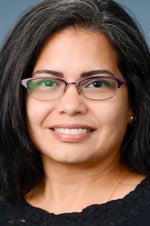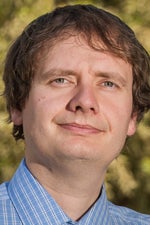UC Davis this year is giving not one but two Early Career Faculty Awards for Creativity and Innovation. The recipients (each of whom receives $40,000 to support their research proposals as listed):
- Lillian Cruz-Orengo, assistant professor, Department of Anatomy, Physiology and Cell Biology, School of Veterinary Medicine — “A Novel Human Blood-Brain Barrier Model”
- Jaroslav Trnka, assistant professor, Department of Physics, College of Letters and Science — “Quantum Scattering”
This is the second round of this award program, funded by an endowment from anonymous donors. The fund provides one award per year to a nontenured, ladder-track member of the UC Davis faculty — an up-and-coming faculty member who exhibits great promise as a creator and innovator in his or her research.
This year’s selection committee reported being evenly divided between two nominees, each of whom “promises a significant advance that would bring distinction to UC Davis, but in very different spheres: biomedical research versus theoretical physics.”
In consultation with the donors, the campus decided to provide a second award this year. “I am pleased that we are able to acknowledge not one but two remarkable young faculty members for the important research they are doing,” said Ralph J. Hexter, provost and executive vice chancellor.
Deans submitted seven nominations in all. Here is more about the winning projects:

“A Novel Human Blood-Brain Barrier Model” — Cruz-Orengo explained how the brain, the most important organ in the human body, is guarded by a “fence” called the blood-brain barrier, or BBB. “Unfortunately, adequate models that could fully replicate this ‘fence’ are lacking,” she wrote in her proposal. “Our purpose is to develop a model that more efficiently replicates the uniqueness of the human BBB in the laboratory.” She noted how the specific modifications proposed in this project “are the first attempts in the field of BBB research.”
Cruz-Orengo elaborated in an email to Dateline UC Davis: “We want to develop an in vitro BBB model using inducible pluripotent stem cells, aka iPSC.
“Briefly, we are going to stimulate on these cells the expression of two proteins that were recently identified as required for barrier tightness. These two proteins together work as a kind of ‘mortar mix,’ like what construction workers would use to build a block fence.
“Because of this, we hope to mimic much better the unique BBB properties than other methods currently available. Ultimately, we want to advance our understanding of the BBB physiology in health and disease, benefiting biomedical and translational research.”
Cruz-Orengo came to UC Davis in 2014 as a CAMPOS Faculty Scholar (Center for the Advancement of Multicultural Perspectives in Science) and received her faculty appointment in neuroimmunology in 2016. She is a graduate of the University of Puerto Rico (Bachelor of Science in biology and art history, and Ph.D. in physiology and neuroscience) and served as a postdoctoral research scholar at the University of Washington in Saint Louis School of Medicine from 2006 to 2013.

“Quantum Scattering” — In researching nature’s smallest particles, Trnka and Nima Arkani-Hamed put forth in 2013 “a completely new picture for particle scattering known as amplituhedron, connecting original ideas from geometry and combinatorics,” as described by Trnka in his proposal. Now, with his Early Career Faculty Award for Creativity and Innovation, he plans to enhance this innovative approach to fundamental physics. “This will need very creative thinking as it requires the invention of new ideas rather than using existing methods,” he wrote in his proposal.
Amplituhedron, Trnka explained in an email to Dateline UCDavis, is an alternative to Feynman diagrams developed in the 1950s, referring to a method of organizing calculations in quantum field theory using pictures of particle interactions.
“The amplituhedron is a new way of calculating the same thing: Instead of evaluating Feynman diagrams, you calculate volume of a geometric object — amplituhedron — which happens to give exactly the same answer.
“This is a radical change of paradigm in how to think about elementary particles and fundamental laws of nature. ... The picture of particle dynamics is replaced here by the static geometry, but it happens to calculate the same thing. This not only provides a new computational tool but also sheds a new light on how to think about fundamental laws of nature in a new geometric way.”
Trnka joined the UC Davis faculty in 2015 and is a founding member of the university’s Center for Quantum Mathematics and Physics, or QMAP. He was a postdoctoral fellow at the California Institute of Technology from 2013 to 2015. He has degrees from Charles University in Prague, Czech Republic (B.S. and M.S. in physics), and Princeton University (Ph.D. in physics).